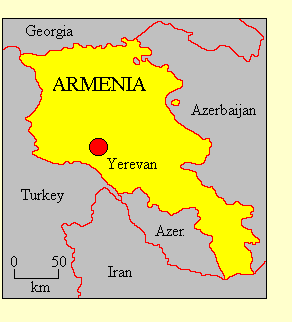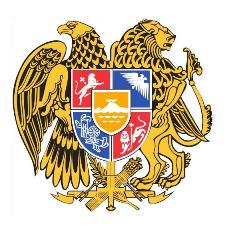

REPUBLIC OF ARMENIA
• Official name: Hayastani Hanrapetut'yun (Republic of Armenia). (The Armenians call their country Hayastan.
"Armenia" is a classical name for the western Caucasus.)
• Location: European Caucasus
• International organisations: Commonwealth of Independent States, Council of Europe, Organisation
for Security and Co-operation in Europe, United Nations, World Trade Organisation
• Borders: Azerbaijan, Georgia, Iran, Turkey
• Coastline: None
• Land area: 29,800 Km2
• Population: 3,000,000
• Annual GDP (PPP) per capita: US$5,900 (2009 CIA estimate). World ranking: 109
• Ethnicity: Armenian 93%, Kurdish 4%, Russian 2%.
• Languages: Armenian is the official language and is spoken by over 95% of the population. Russian is widely used.
• Religion: Orthodox Christian 95%. There is a small Moslem minority.
• Form of government: Presidential democratic republic. Armenia is divided into 11 provinces.
• Capital: Yerevan
• Constitution: The Constitution of the Republic of Armenia came into effect on 5 July 1995.
• Head of state: The President, elected by direct universal suffrage for a five-year term.
• Head of government: The Prime Minister, appointed by the President. the Prime Minister is the leader of the largest party in the legislature and is accountable to it.
• Legislature: Armenia has a unicameral legislature, the National Assembly (Azgayin Zhoghov), which has 131 members elected for four-year terms. Of these, 56 are elected from single-member constituencies and 75 are elected by
proportional representation.
• Electoral authority: The Central Elections Commission administers national elections.
• Freedom House 2011 rating: Political Rights 6, Civil Liberties 4
• Transparency International Corruption Index: 26% (123 of 178 countries rated)
• Reporters Without Borders Press Freedom 2010 Index: 27.5% (101 of 178 countries rated)
• Heritage Foundation Economic Freedom 2010 Index: 69.7% (36 of 178 countries rated)
Political history
The remnants of the ancient kingdom of Armenia, which at various times extended over what is now eastern Turkey and the Caucasus, were
absorbed into the Ottoman Empire in the 15th century. In 1828 Russia acquired the Caucasian territory of Armenia, but the great majority of
Armenians lived in eastern Anatolia. Between 1894 and 1915 most of these Armenians were massacred or driven out by the Ottomans, leaving
only the small Armenian territory under Russian rule.
This territory briefly became independent in 1918, but in 1920 it was conquered by the Russian communists, becoming part of the
Federative Union of Soviet Socialist Republics of Transcaucasia in 1922. In 1936 it became the Armenian Soviet Socialist Republic.

Armenia has historically viewed the Russians as its protector against the Turks, and was thus reluctant to become independent in 1991
until the Soviet Union's collapse left it no choice. Independent Armenia was soon entangled in a war with Azerbaijan over Nagorny-Karabakh,
an Armenian enclave in Azeri territory. Armenia now occupies 20% of Azerbaijan.
In 1991 Levon Ter-Petrossian was elected as first president of Armenia. In 1995 voters approved a new constitution that
strengthened the president's powers. Ter-Petrossian was re-elected in 1996 but resigned in 1998, and Robert Kocharian was elected
president. In October 1999 terrorists stormed the parliament in a coup attempt, killing the prime minister. In 2008 Kocharian was succeeded
by
Serzh Sargsyan.
The dominant party in Armenia is President Sargsyan's Republican Party of Armenia (HHP), which is mainly a
personal vehicle for the president. It is opposed by the conservative Prosperous
Armenia and the leftist Armenian Revolutionary Federation. At the 2007 election the HHP won a
comfortable majority in the legislature.
Freedom House's 2011 report on Armenia says:
"Armenia is not an electoral democracy... elections since the 1990s have been marred by major irregularities. The May 2007 parliamentary
vote was described by the OSCE as an improvement, albeit flawed, over previous polls, but the 2008 presidential election was seriously
undermined by problems with the vote count, a biased and restricted media environment, and the abuse of administrative resources in favor
of ruling party candidate Serzh Sarkisian... Bribery and nepotism are reportedly common among government officials, who are rarely prosecuted
or removed for abuse of office... There are limits on press freedom in Armenia. The authorities use informal pressure to maintain control over
broadcast outlets, the chief source of news for most Armenians... In the aftermath of the 2008 post-election violence, the government
imposed restrictions on freedom of assembly... The judiciary is subject to political pressure from the executive branch and suffers from
considerable corruption."
Updated October 2011
|

